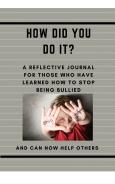Tips for Teachers: Ways to Help Students Who Struggle With Emotions and Behavior
http://www.mentalhealthamerica.net/conditions/tips-teachers-ways-help-students-who-struggle-emotions-or-behavior
http://www.mentalhealthamerica.net/conditions/tips-teachers-ways-help-students-who-struggle-emotions-or-behavior
How does childhood bullying affect a person’s self confidence, resiliency, and courage? How much fear still remains in the victim in social situations and during even the smallest of confrontations?
There are those that have overcome the fear bullying and that is what this journal is about. It is an opportunity for those who were bullied to document their experience and let others know how they did it. They can tell their story and then through reflection and insight lay out their plan of how they regained their confidence and emotional strength. It is designed to help the journal writer realize how they really are a type of pioneer who has paved the way for others to follow. It is my hope that they share their success with others.
Who should use this journal? Anyone who wants to make a difference in their life and the lives of others. It is great for high school teenagers, young adults, those who are still being bullied that need to make a plan to overcome issues that are standing in their way of a successful life. It can be used as a resource for those in the mental health industry, youth groups, guidance counselors and school social workers.
This Journal can be used by anyone to write about how they overcame the fear of bullying. They should take the time to answer the questions and share their success with others and keep track of the progress that was made. It is great tool for groups or individuals. They can continue to journal and use the Life Notebook section to stay up to date on their ongoing success story
 To Order Your Copy Click On The Image Above
To Order Your Copy Click On The Image Above

Parents: Signs that your teen is being bullied
Bullying is threatening, aggressive, persistent and unwanted behavior that intentionally harms another person emotionally and/or physically. There are several different types of bullying that may occur among teens, including physical bullying, emotional bullying, verbal bullying and/or cyberbullying. It is extremely important that parents, as well as children, understand that there is no form of bullying that is less serious or that requires less attention than another form of bullying. The person being bullied usually has difficulty preventing the behaviors that are being directed toward them, and they often struggle with defending themselves. Many teens, especially boys, will not tell their parent or another adult that they are being bullied. So, it is extremely important that parents are aware of the possible signs that their teen is being bullied. The following guide will help you recognize the signs of a teen that is being bullied.
Identifying Potential Victims of Bullying
In most situations a victim of a bully will display signs of being distressed. Signs may include withdrawal, anxiety, cutting class, depression and/or a decrease in school performance. Unfortunately, some teens may become the victim of a bully simply because they are considered to be a minority, such as ethnic minorities, religious minorities, low economic status, and homosexuals or simply because they are smaller in stature than the bully. However, any child or teenager can become the victim of a bully, without falling into one of the above categories. Although the victims of a bully may vary, it is common for teens that are different in some way than their peers to fall prey to a bully.
Signs That Your Teen is Being Bullied
There are typically warning signs that can indicate when a teen is being bullied; however, not all kids that are being bullied will exhibit the warning signs. It is essential that parents talk to their teens on a regular basis about bullying and encourage them to come to you or another adult if they are being bullied. Some of the warning signs of a teen being bullied may include:
Bullying can happen to girls or boys and children of all ages at any time. It is vital that you talk with your teens about bullying and encourage them to learn what to do if they are being bullied. It is also equally important to talk with teens you suspect are being bullies about their behavior. Encourage your teenager to speak up when witnessing bullying and to speak up when being bullied. It is also extremely important to encourage schools to enact no bulling policies and encourage the school faculty to intervene.